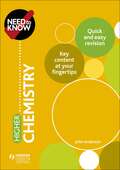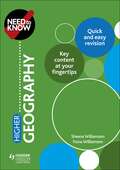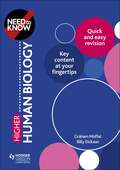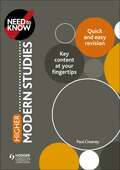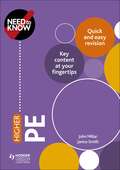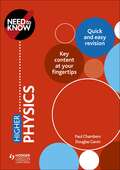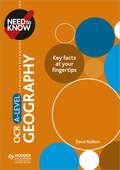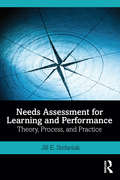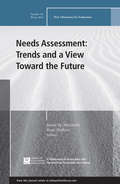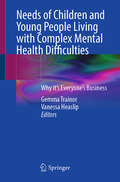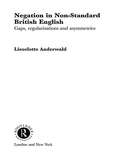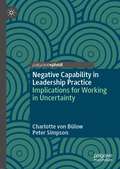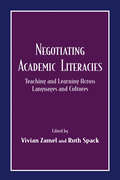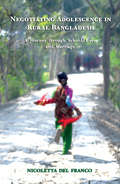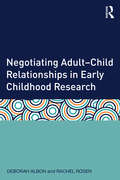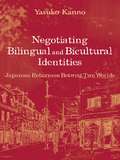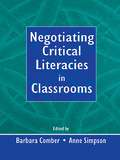- Table View
- List View
Need to Know: Higher Chemistry
by John AndersonExam board: SQALevel: HigherSubject: ChemistryFirst teaching: September 2018 First exams: Summer 2019What do you really need to know for the SQA Higher Chemistry exam?This revision guide covers the essentials in less than 100 pages, so it's perfect for early exam preparation or last-minute revision.- Find key content at your fingertips with quick summaries of the concepts, processes and terminology that you need to understand- Get a better grade in your exam with tips on exam technique, mistakes to avoid and important things to remember- Revise and practise using end-of-topic questions and in-depth questions at the end of each section - with answers provided online - Benefit from the knowledge of experienced teacher, author and examiner John Anderson
Need to Know: Higher Chemistry Epub
by John AndersonExam board: SQALevel: HigherSubject: ChemistryFirst teaching: September 2018 First exams: Summer 2019What do you really need to know for the SQA Higher Chemistry exam?This revision guide covers the essentials in less than 100 pages, so it's perfect for early exam preparation or last-minute revision.- Find key content at your fingertips with quick summaries of the concepts, processes and terminology that you need to understand- Get a better grade in your exam with tips on exam technique, mistakes to avoid and important things to remember- Revise and practise using end-of-topic questions and in-depth questions at the end of each section - with answers provided online - Benefit from the knowledge of experienced teacher, author and examiner John Anderson
Need to Know: Higher Geography
by Sheena Williamson Fiona WilliamsonExam board: SQALevel: HigherSubject: GeographyFirst teaching: September 2018 First exams: Summer 2019 What do you really need to know for the SQA Higher Geography exam?This revision guide covers the essentials in less than 90 pages, so it's perfect for early exam preparation or last-minute revision.- Find key content at your fingertips with quick summaries of the processes, issues and terminology that you need to understand- Get a better grade in your exam with tips on exam technique, mistakes to avoid and important things to remember- Revise and practise using end-of-topic questions and synoptic questions at the end of each section - with answers provided onlineThis book covers all topics except for Energy from the Global Issues component.
Need to Know: Higher Geography
by Sheena Williamson Fiona WilliamsonExam board: SQALevel: HigherSubject: GeographyFirst teaching: September 2018 First exams: Summer 2019 What do you really need to know for the SQA Higher Geography exam?This revision guide covers the essentials in less than 90 pages, so it's perfect for early exam preparation or last-minute revision.- Find key content at your fingertips with quick summaries of the processes, issues and terminology that you need to understand- Get a better grade in your exam with tips on exam technique, mistakes to avoid and important things to remember- Revise and practise using end-of-topic questions and synoptic questions at the end of each section - with answers provided onlineThis book covers all topics except for Energy from the Global Issues component.
Need to Know: Higher Human Biology
by Graham Moffat Billy DicksonExam board: SQALevel: HigherSubject: Human BiologyFirst teaching: September 2018 First exams: Summer 2019 What do you really need to know for the SQA Higher Human Biology exam?This revision guide covers the essentials in less than 100 pages, so it's perfect for early exam preparation or last-minute revision.- Find key content at your fingertips with quick summaries of the concepts, processes and terminology that you need to understand- Get a better grade in your exam with tips on exam technique, mistakes to avoid and important things to remember- Revise and practise using end-of-topic questions and in-depth questions at the end of each section - with answers provided online- Benefit from the knowledge of experienced teachers, examiners and authors Graham Moffat and Billy Dickson
Need to Know: Higher Human Biology Epub
by Graham Moffat Billy DicksonExam board: SQALevel: HigherSubject: Human BiologyFirst teaching: September 2018 First exams: Summer 2019 What do you really need to know for the SQA Higher Human Biology exam?This revision guide covers the essentials in less than 100 pages, so it's perfect for early exam preparation or last-minute revision.- Find key content at your fingertips with quick summaries of the concepts, processes and terminology that you need to understand- Get a better grade in your exam with tips on exam technique, mistakes to avoid and important things to remember- Revise and practise using end-of-topic questions and in-depth questions at the end of each section - with answers provided online- Benefit from the knowledge of experienced teachers, examiners and authors Graham Moffat and Billy Dickson
Need to Know: Higher Modern Studies
by Paul CreaneyExam board: SQALevel: HigherSubject: Modern StudiesFirst teaching: September 2018 First exams: Summer 2019 What do you really need to know for the SQA Higher Modern Studies exam?This revision guide covers the essentials in just 112 pages, so it's perfect for early exam preparation or last-minute revision.- Find key content at your fingertips with quick summaries of the issues, processes and terminology that you need to understand- Get a better grade in your exam with tips on exam technique, mistakes to avoid and important things to remember- Revise and practise using end-of-topic questions and synoptic questions at the end of each section - with answers provided online- Benefit from the knowledge of experienced teacher Paul CreaneyThis book covers the following content:- Democracy in Scotland and the UK: All topics- Social Issues in the UK: Social Inequality and Crime and the Law- International Issues: Terrorism (World Powers) and The Development of Africa (World Issues)
Need to Know: Higher Modern Studies Epub
by Paul CreaneyExam board: SQALevel: HigherSubject: Modern StudiesFirst teaching: September 2018 First exams: Summer 2019 What do you really need to know for the SQA Higher Modern Studies exam?This revision guide covers the essentials in just 112 pages, so it's perfect for early exam preparation or last-minute revision.- Find key content at your fingertips with quick summaries of the issues, processes and terminology that you need to understand- Get a better grade in your exam with tips on exam technique, mistakes to avoid and important things to remember- Revise and practise using end-of-topic questions and synoptic questions at the end of each section - with answers provided online- Benefit from the knowledge of experienced teacher Paul CreaneyThis book covers the following content:- Democracy in Scotland and the UK: All topics- Social Issues in the UK: Social Inequality and Crime and the Law- International Issues: Terrorism (World Powers) and The Development of Africa (World Issues)
Need to Know: Higher PE
by John Millar Janice SmithExam board: SQALevel: HigherSubject: PEFirst teaching: September 2018First exams: Summer 2019 What do you really need to know for the SQA Higher PE exam?This revision guide covers the essentials in less than 100 pages, so it's perfect for early exam preparation or last-minute revision.- Find key content at your fingertips with quick summaries of the factors, concepts and terminology that you need to understand- Get a better grade in your exam with tips on exam technique, mistakes to avoid and important things to remember- Revise and practise using end-of-topic questions and in-depth questions at the end of each section - with answers provided online - Benefit from the knowledge of experienced teachers and examiners John Millar and Janice Smith
Need to Know: Higher PE
by John Millar Janice SmithExam board: SQALevel: HigherSubject: PEFirst teaching: September 2018First exams: Summer 2019 What do you really need to know for the SQA Higher PE exam?This revision guide covers the essentials in less than 100 pages, so it's perfect for early exam preparation or last-minute revision.- Find key content at your fingertips with quick summaries of the factors, concepts and terminology that you need to understand- Get a better grade in your exam with tips on exam technique, mistakes to avoid and important things to remember- Revise and practise using end-of-topic questions and in-depth questions at the end of each section - with answers provided online - Benefit from the knowledge of experienced teachers and examiners John Millar and Janice Smith
Need to Know: Higher Physics
by Paul Chambers Douglas GavinExam board: SQALevel: HigherSubject: PhysicsFirst teaching: September 2018First exams: Summer 2019What do you really need to know for the SQA Higher Physics exam?This revision guide covers the essentials in less than 100 pages, so it's perfect for early exam preparation or last-minute revision.- Find key content at your fingertips with quick summaries of the concepts, issues and terminology that you need to understand- Get a better grade in your exam with tips on exam technique, mistakes to avoid and important things to remember- Revise and practise using end-of-topic questions and in-depth questions at the end of each section - with answers provided online
Need to Know: Higher Physics Epub
by Paul Chambers Douglas GavinExam board: SQALevel: HigherSubject: PhysicsFirst teaching: September 2018First exams: Summer 2019What do you really need to know for the SQA Higher Physics exam?This revision guide covers the essentials in less than 100 pages, so it's perfect for early exam preparation or last-minute revision.- Find key content at your fingertips with quick summaries of the concepts, issues and terminology that you need to understand- Get a better grade in your exam with tips on exam technique, mistakes to avoid and important things to remember- Revise and practise using end-of-topic questions and in-depth questions at the end of each section - with answers provided online
Need to Know: Ocr A-level Geography Epub
by David RedfernExam board: OCRLevel: A-levelSubject: GeographyFirst teaching: September 2016First exams: Summer 2017 (AS); Summer 2018 (A-level)Find what you need to know, when you need it, with key facts at your fingertips for OCR A-level Geography.Keep this course companion by your side throughout your A-levels so you can check content, review your understanding, use quick tips for success and improve your exam performance.Written by an experienced teacher, author and former senior examiner, this book will help you to:- Build on your learning throughout the course by reinforcing the key facts, terms and concepts from the OCR A-level Geography specification- Answer exam questions more effectively with tips on exam technique, mistakes to avoid and important things to remember- Revise with confidence using 'Do you know?' questions at the end of each topic and more in-depth questions at the end of each sectionThis book covers the following topics:Physical systems- Landscape Systems - Option A: Coastal Landscapes- Earth's Life Support SystemsHuman interactions- Changing Spaces; Making Places- Global Connections - Global Systems Option B: Global Migration- Global Connections - Global Governance Option D: Power and Borders Geographical debates- Disease Dilemmas- Hazardous Earth
Needs Assessment for Learning and Performance: Theory, Process, and Practice
by Jill E. StefaniakNeeds Assessment for Learning and Performance offers comprehensive coverage of the knowledge and skills needed to develop and conduct needs assessments and to analyze, interpret, and communicate results to clients and organizations. Though critical to planning any performance improvement system, needs assessments can feel abstract and vague to students who have not yet managed the process in a professional setting. This first-of-its-kind textbook uses a variety of real-world examples to connect major theories and models to effective principles for practice. Each chapter offers guiding questions, key terms and concepts, recommended readings, and case studies illustrating how needs assessment training can be applied. Graduate students and researchers of instructional design, human resources, performance improvement, program evaluation, and other programs will find this volume relevant to a range of academic and organizational contexts.
Needs Assessment: New Directions for Evaluation, Number 144 (J-B PE Single Issue (Program) Evaluation)
by Ryan Watkins James W. AltschuldExplore multiple practical and theoretical dimensions of needs assessment. This volume focuses exclusively on this essential topic for guiding decisions—examining subjects such as: the importance of defining needs, implementing assessments in public and private-sector organizations, aligning needs with assets and capacity assessments, how assessments factor into meaningful change at the organizational and society levels how to apply needs assessments in culturally diverse contexts conducting international needs assessments, and the impact of technologies on needs assessment methods. This issue will help professionals within public and private organizations conduct useful assessments, ones leading to results that can be applied in decisions. This is the 144th issue in the New Directions for Evaluation series from Jossey-Bass. It is an official publication of the American Evaluation Association.
Needs of Children and Young People Living with Complex Mental Health Difficulties: Why it’s Everyone’s Business
by Vanessa Heaslip Gemma TrainorThis book highlights how it is increasingly important that nurses and other health and social care professionals working with or caring for children and young people (CYP) can contribute to the care and support these vulnerable individuals need. Given the limited specialist mental health services available for CYP, this book helps to recognise when referral to specialist services is required. It is aimed at providing nurses, other health and social care professionals with a comprehensive understanding of some of the complex mental health issues faced by young people today and to provide them with confidence in how to interact helpfully with them. While covering a range of complex mental health issues (such as self-harm, eating disorders, and psychosis) this book also explores wider factors that can influence poor mental health (such as being Looked After, having a disability, drugs and alcohol, and social media). Alongside these, it explores some of the wider systems and processes that can provide practical guidance to practitioners (having a Trauma-informed approach, awareness of risk management, and safeguarding). Lastly, the book recognises how overwhelming it can be for practitioners working in this field and explores how they can use reflective practice and self-care in the development of a therapeutic relationship that enables them to interact positively and non-judgementally with young people with complex mental health issues. Examples of good practice are provided throughout the book by using case scenarios and tips from young people with lived experience.This book will prove to be an invaluable guide to assist nurses, teachers, social workers, paramedics, health care assistants and police force in giving help and support to CYP.
Neel's Pumpkin (Miss Rhonda's Readers #Set Two)
by Rhonda LucadamoMeet Neel and the pumpkins he grows.
Negation in Non-Standard British English: Gaps, Regularizations and Asymmetries (Routledge Studies in Germanic Linguistics #Vol. 8)
by Lieselotte AnderwaldDespite the advances of radio and television and increasing mobility and urbanization, spoken English is by no means becoming more like the written standard. English dialect grammar, however, is still a new and relatively undeveloped area of research, and most studies to date are either restricted regionally, or based on impressionistic statements. This book provides the first thorough empirical study of the field of non-standard negation across Great Britain.
Negative Capability in Leadership Practice: Implications for Working in Uncertainty
by Peter Simpson Charlotte von BülowWorking in uncertainty has become the new normal, but what do leaders have to draw upon when lacking the requisite knowledge? In this book, the authors make a case for Negative Capability, which enables leaders to work in a state of not knowing without simply reaching for old ideas or resorting to habitual behaviours. It is not a practice that can be measured, but its impact in leadership practice is immense and tangible. Offering fresh insights for leadership students, researchers, and practitioners on the challenges of working in uncertainty, the book offers a novel perspective on Negative Capability as a way of being. Each chapter explores an aspect of Negative Capability through the accounts of leaders and managers who had the courage to explore this way of being and share the stories about its powerful impact. Ultimately, this book explores how a practice of attention can lead to new ways of understanding the role of purpose, leisure, and passion in leadership practice.
Negotiating Academic Literacies: Teaching and Learning Across Languages and Cultures
by Ruth Spack Vivian ZamelNegotiating Academic Literacies: Teaching and Learning Across Languages and Cultures is a cross-over volume in the literature between first and second language/literacy. This anthology of articles brings together different voices from a range of publications and fields and unites them in pursuit of an understanding of how academic ways of knowing are acquired. The editors preface the collection of readings with a conceptual framework that reconsiders the current debate about the nature of academic literacies. In this volume, the term academic literacies denotes multiple approaches to knowledge, including reading and writing critically. College classrooms have become sites where a number of languages and cultures intersect. This is the case not only for students who are in the process of acquiring English, but for all learners who find themselves in an academic situation that exposes them to a new set of expectations. This book is a contribution to the effort to discover ways of supporting learning across languages and cultures--and to transform views about what it means to teach and learn, to read and write, and to think and know. Unique to this volume is the inclusion of the perspectives of writers as well as those of teachers and researchers. Furthermore, the contributors reveal their own struggles and accomplishments as they themselves have attempted to negotiate academic literacies. The chronological ordering of articles provides a historical perspective, demonstrating ways in which issues related to teaching and learning across cultures have been addressed over time. The readings have consistency in terms of quality, depth, and passion; they raise important philosophical questions even as they consider practical classroom applications. The editors provide a series of questions that enable the reader to engage in a generative and exciting process of reflection and inquiry. This book is both a reference for teachers who work or plan to work with diverse learners, and a text for graduate-level courses, primarily in bilingual and ESL studies, composition studies, English education, and literacy studies.
Negotiating Adolescence in Rural Bangladesh: A Journey through School, Love and Marriage
by Nicoletta Del FrancoThe book interrogates the experience of being young and becoming adult in rural Bangladesh, in a context of profound processes of socio economic change. Throughout South Asia, new educational opportunities and an increase in the age at which girls and boys get married are opening new spaces for young people to live the passage to adulthood. This book documents and describes the everyday reality of this changing gendered transition for young people in a rural area of South West Bangladesh. If focuses on three main areas that are central to young people's experience: those of college and student life, friendships and relationships with those of the same sex and across sexes and marriage and the issues involved in the choice of a marriage partner.
Negotiating Adult-Child Relationships in Early Childhood Research
by Deborah Albon Rachel RosenNegotiating Adult–Child Relationships in Early Childhood Research presents a substantive critique of technicist and neoliberal approaches to ethics through an exploration of the complicated and often ‘messy’ situations faced in negotiating relationships in research with children. Despite growing acknowledgement of their centrality, relationships between adult researchers and very young participants have been neglected and under-theorised, and in response, this book offers a comprehensive conceptualisation of adult–child research relationships through examination of questions, including: How do power and inequity impact on adult–child research relationships? What does it mean for relationships when researchers ‘intervene’ in the field? How do bodies matter in research relationships? What does an emphasis on relationships with young children mean for the research process? Drawing on data from their own research, the authors contend that relationships are part of a wider web of social relations and space–time configurations. They propose and develop a relational ethics of answerability and social justice, inspired by the work of Bakhtin and, in addition, explore the way material bodies come to matter, the ambiguity of consent in educator-research, and the risks and possibilities of research relationships. Chapters include innovative formulations of reciprocity, ‘sensing practices’, and political-ethical responsibility. This book contributes to current debates about research with young children, offering an incisive and thorough exploration of the importance of relationships to the research process. Relevant for international audiences, this book is essential reading for early childhood students and educators, researchers, and lecturers with an interest in research with children.
Negotiating Bilingual and Bicultural Identities: Japanese Returnees Betwixt Two Worlds
by Yasuko KannoThis book examines the changing linguistic and cultural identities of bilingual students through the narratives of four Japanese returnees (kikokushijo) as they spent their adolescent years in North America and then returned to Japan to attend university. As adolescents, these students were polarized toward one language and culture over the other, but through a period of difficult readjustment in Japan they became increasingly more sophisticated in negotiating their identities and more appreciative of their hybrid selves. Kanno analyzes how educational institutions both in their host and home countries, societal recognition or devaluation of bilingualism, and the students' own maturation contributed to shaping and transforming their identities over time. Using narrative inquiry and communities of practice as a theoretical framework, she argues that it is possible for bilingual individuals to learn to strike a balance between two languages and cultures. Negotiating Bilingual and Bicultural Identities: Japanese Returnees Betwixt Two Worlds: *is a longitudinal study of bilingual and bicultural identities--unlike most studies of bilingual learners, this book follows the same bilingual youths from adolescence to young adulthood; *documents student perspectives--redressing the neglect of student voice in much educational research, and offering educators an understanding of what the experience of learning English and becoming bilingual and bicultural looks like from the students' point of view; and *contributes to the study of language, culture, and identity by demonstrating that for bilingual individuals, identity is not a simple choice of one language and culture but an ongoing balancing act of multiple languages and cultures. This book will interest researchers, educators, and graduate students who are concerned with the education and personal growth of bilingual learners, and will be useful as text for courses in ESL/bilingual education, TESOL, applied linguistics, and multicultural education.
Negotiating Critical Literacies in Classrooms
by Anne Simpson Barbara ComberNegotiating Critical Literacies in Classrooms brings together accounts of educators who have sought to make a difference in the lives of their students through literacy education--from university classrooms in the United States, England, and South Africa, to policy and curriculum development in Singapore and Australia. Each chapter represents the results of extended research on classroom practice. The authors in this collection write as teachers. The literacy classrooms they explore range from the early years of schooling, to primary and secondary education, through to community and university sites. Although the volume is organized around different levels of education, clearly overlapping themes emerge across the chapters, including identity formation and textual practices, politicizing curriculum and textbook production, and changing the power relations in classroom talk around text. An overarching theme of this collection is the belief that there is no one generic, universal critical literacy--in theory or in practice. Rather, the authors reveal how a range of theories can serve as productive starting points for educators working on social justice agendas through the literacy curriculum, and, equally important, how particular critical literacy theories or pedagogies must be worked out in specific locations. In each of these accounts, educators explain how they have taken a body of theory and worked with and on it in classrooms. Their rich portrayals and narratives of classroom realities illustrate the unanticipated effects of pedagogies that emerge in specific contexts. Experiences from the classrooms have led them to revise theories that are central to critical literacy, including constructs such as "empowerment," "resistance," and "multiple readings." This collection documents what occurs when educators confront the difficult ethical and political issues that evolve in particular classroom situations. Negotiating Critical Literacies in Classrooms is appropriate as a text for courses in language and literacy education, and will be of broad interest to educational researchers, practitioners, and theorists. The practical classroom focus makes this book accessible and of interest to a wide range of teachers and an excellent resource for professional development. The international scope will appeal to a global educational readership.
